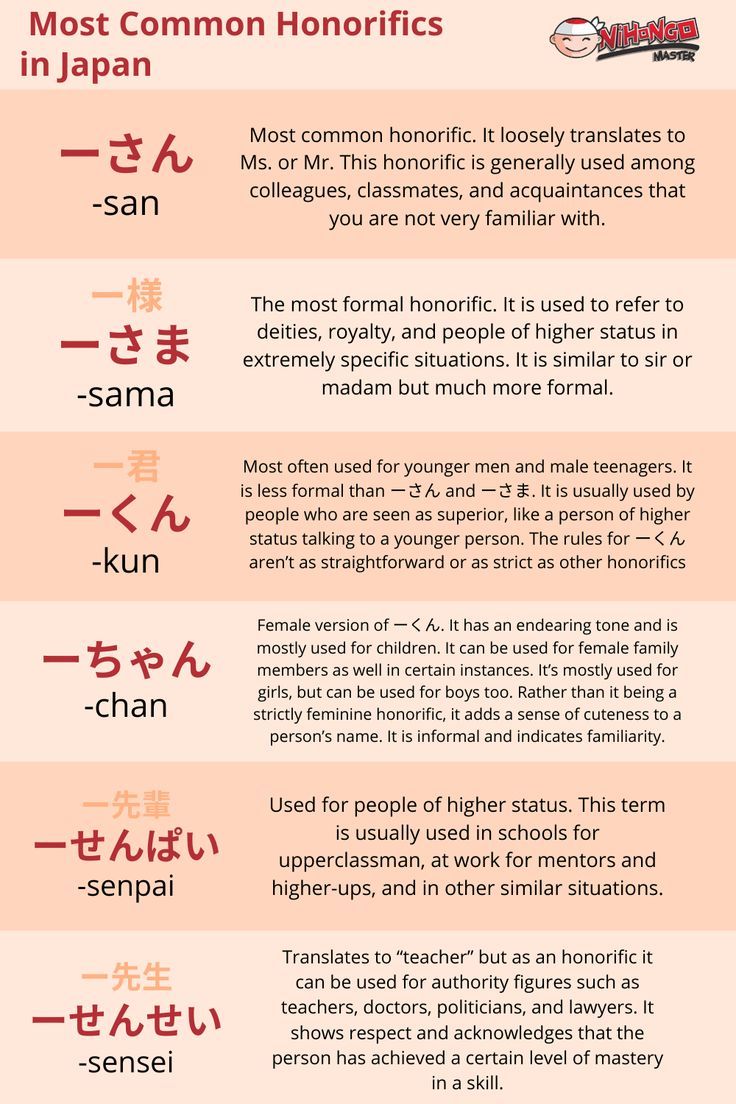Most Common Honorifics in Japanese

| Hiragana | Kanji/Kana | Pronunciation | Used For / Notes |
|---|---|---|---|
| さん | 一さん | -san | Most common; polite and neutral; for people you’re not very close to. |
| さま | 一様 / 一さま | -sama | Extremely formal; for deities, royalty, or customers. |
| くん | 一君 / 一くん | -kun | Used for boys or male juniors; casual and familiar. |
| ちゃん | 一ちゃん | -chan | Cute/affectionate; often used with kids, girls, or pets. |
| せんぱい | 一先輩 | -senpai | For senior colleagues or upperclassmen. |
| せんせい | 一先生 | -sensei | Used for teachers, doctors, or experts in a skill. |
1. さん (san)
Usage: Neutral, respectful, widely used
Translation: Mr., Ms., Mrs.
Details:
Most common and safe honorific to use.
Suitable for most adults regardless of gender or age.
Used in business, school, or casual settings when not close to the person.
Examples:
田中さん(たなかさん)
Tanaka-san
お母さん(おかあさん)
mother
鈴木さん、これはあなたのですか?
(すずきさん、これはあなたのですか?)
— Mr./Ms. Suzuki, is this yours?
2. さま (sama)
Usage: Extremely respectful/formal
Translation: Sir, Madam, Lord, or Lady
Details:
Shows utmost respect.
Used for customers (お客様 – okyakusama), deities, royalty, and sometimes sarcastically.
Used in customer service, letters, or very polite speech.
Examples:
お客様 (おきゃくさま)
dear customer
神様 (かみさま)
God
山田様 (やまださま)
Mr./Ms. Yamada (formal)
3. くん (kun)
Usage: Casual, familiar; typically for younger males
Translation: —
Details:
Often used for boys, younger males, or subordinates.
Teachers use it for male students.
Can also be used for females in very specific, friendly or work contexts.
Examples:
ケンくん
Ken (in a friendly tone)
社長が田中くんを呼んでいる。
(しゃちょうが たなかくんを よんでいる。)
The boss is calling Tanaka-kun.
4. ちゃん (chan)
Usage: Cute, affectionate
Translation: —
Details:
Used for children, close friends, pets, or anything “cute.”
Common with girls, young kids, lovers, or family members.
Informal, not used in professional settings.
Examples:
あいちゃん
Ai (affectionate)
猫ちゃん(ねこちゃん)
kitty
おばあちゃん
grandma (loving tone)
5. せんぱい (senpai)
Usage: Respectful to someone senior in rank
Translation: Upperclassman, senior
Details:
Used in schools, clubs, or workplaces for someone more experienced.
Can be used alone or after a name.
Implies mentorship or admiration.
Examples:
田中先輩(たなかせんぱい)
Tanaka-senpai
彼は私の先輩です。
(かれは わたしの せんぱい です。)
He is my senior.
6. せんせい (sensei)
Usage: Teacher or expert
Translation: Teacher, Doctor, Master
Details:
Used for people with specialized skills or authority (e.g., teachers, doctors, lawyers, artists).
Can be used alone or with a surname.
Shows respect for someone who has achieved expertise.
Examples:
鈴木先生(すずきせんせい)
Mr./Ms. Suzuki (teacher)
山田先生、診察をお願いします。
(やまだせんせい、しんさつを おねがいします。)
Dr. Yamada, please examine me.
書道の先生 (しょどうのせんせい)
calligraphy master
Related Post:
Common Japanese Honorific Titles
Honorific speech in Japanese
 Learn Japanese Learn Japanese
Learn Japanese Learn Japanese







